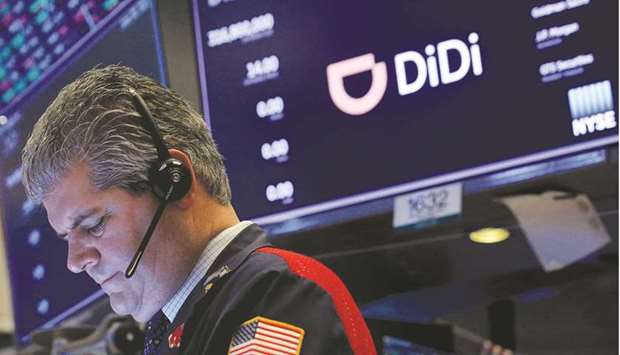Chinese regulators are considering serious, perhaps unprecedented, penalties for Didi Global Inc after its controversial initial public offering last month, according to people familiar with the matter.
Regulators see the ride-hailing giant’s decision to go public despite pushback from the Cyberspace Administration of China as a challenge to Beijing’s authority, the people said, asking not to be named because the matter is private. Officials from the CAC, the Ministry of Public Security, the Ministry of State Security, the Ministry of Natural Resources, along with tax, transport and antitrust regulators, began an investigation on-site at the company’s offices, the cyberspace watchdog said in a statement.
Regulators are weighing a range of potential punishments, including a fine, suspension of certain operations or the introduction of a state-owned investor, the people said. Also possible is a forced delisting or withdrawal of Didi’s US shares, although it’s unclear how such an option would play out.
Deliberations are at a preliminary phase and the outcomes are far from certain. Beijing is likely to impose harsher sanctions on Didi than on Alibaba Group Holding Ltd, which swallowed a record $2.8bn fine after a months-long antitrust investigation and agreed to initiate measures to protect merchants and customers, the people said.
“It’s hard to guess what the penalty will be, but I’m sure it will be substantial,” said Minxin Pei, a professor of government at Claremont McKenna College in California.
Didi, the CAC, the China Securities Regulatory Commission and the Ministry of Industry and Information Technology didn’t respond to requests for comment.
Didi’s IPO looked at first like a great success, raising $4.4bn after several troubled years. It turned co-founder Cheng Wei into a billionaire and rewarded long-time backers SoftBank Group Corp, Tiger Global Management and Temasek Holdings Pte.
But the CAC pounced just days later, announcing a cybersecurity review because of the company’s data practices and then banning Didi’s app from the country’s app stores. Its shares quickly plunged below the offering price.
China’s regulators largely supported the idea of an IPO, but they expressed concerns about Didi’s data security practices since at least April, the people said. In one example of concern, Didi had disclosed statistics on taxi trips taken by government officials, one of the people said, although it’s not clear whether that specific issue was raised with the company.
Regulators urged Didi to ensure the security of its data before proceeding with the IPO or to shift the location to Hong Kong or mainland China where disclosure risks would be lower, the people said. Regulators didn’t explicitly forbid the company from going public in the US, but they felt certain Didi understood the official instructions, they said.
One person involved in the meetings, when asked why Didi didn’t act on suggestions from regulators, referred to a proverb that you can’t wake a person pretending to sleep.
The CAC itself has come under scrutiny because of the Didi IPO, with a top Party official having questioned why the agency hadn’t blocked the company’s offering, one of the people said.
Some regulatory officials expressed in private that they think Didi may have rushed its IPO out before China unveiled a new web security law, which could have hurt its valuation, one of the people said. Just days after the offering, China proposed new rules that would require nearly all companies seeking to list in foreign countries to undergo a CAC cybersecurity review.
“Beijing wants the internet sector to understand that cybersecurity and data security are now among the government’s top priorities, and individual companies’ profit can be sacrificed when cybersecurity and data security may be exposed to risks,” said Feng Chucheng, an analyst with consultancy Plenum in Beijing.

A trader works during the IPO for Chinese ride-hailing company Didi Global on the New York Stock Exchange floor on June 30.
